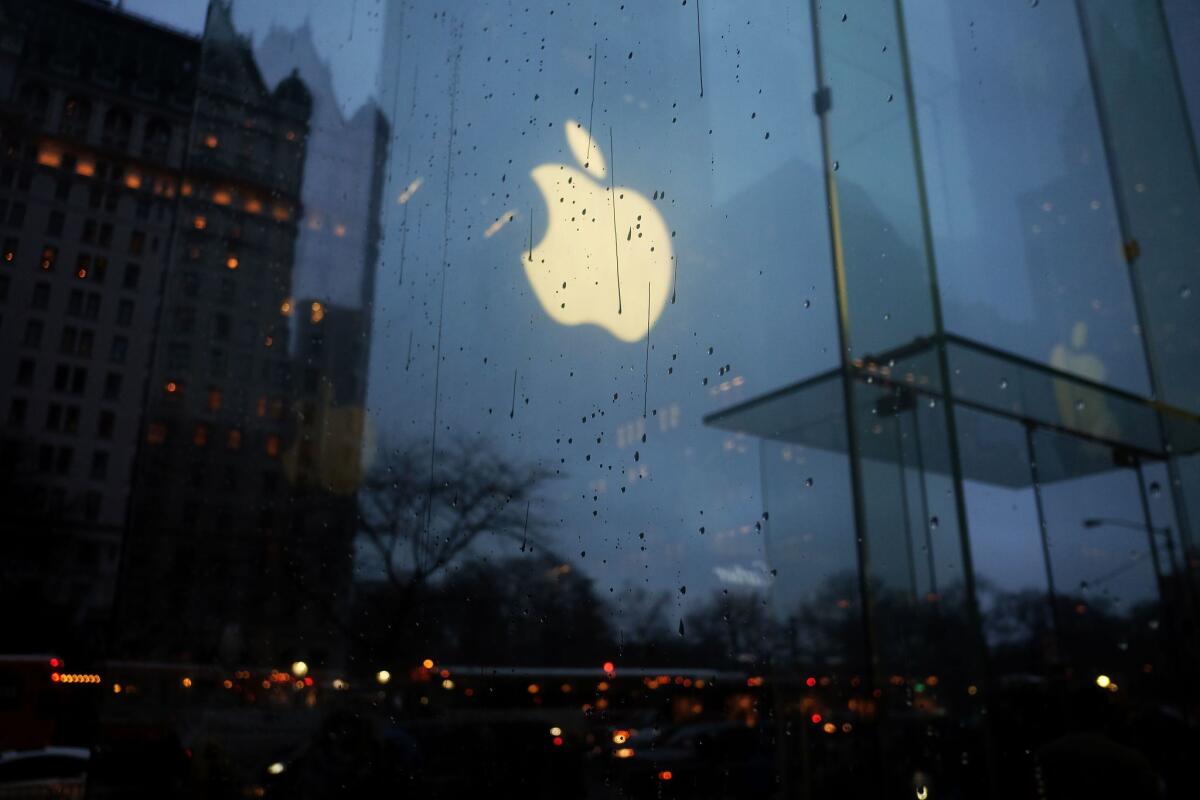Apple says its dispute with the FBI is a 1st Amendment issue that Congress should decide

Apple is battling the U.S. government’s order to circumvent security features on an iPhone that belonged to one of the San Bernardino attackers.
- Share via
Battle lines continued to be drawn in the dispute between Apple Inc. and the FBI as attorneys for the tech giant offered a clearer sense of their strategy to fight efforts to make them assist federal agents in the San Bernardino terror investigation.
At the request of the FBI, a judge has ordered Apple to help unlock an iPhone belonged to one of the San Bernardino attackers. Apple opposes the order, saying that obeying it would threaten the privacy of all iPhone users.
On Tuesday, protesters marched across the nation in support of Apple’s stance. Coordinated by a group called Fight for the Future, which has held protests on other tech issues, the protests were organized in San Francisco, Los Angeles, Apple’s Silicon Valley headquarters and FBI headquarters in Washington, among other locations.
Outside the Apple store at the Grove shopping center in L.A.’s Fairfax district, about a dozen people carried posters and “digital signs” on their Apple devices with such slogans as, “Secure phones save lives.”

Here’s everything you need to know about the fight between Apple and the FBI in two minutes.
Here is a Q&A on Apple’s legal stance:
What will Apple’s argument be?
Apple will say the judge in the case has overreached in her use of an obscure law and infringed on the company’s 1st Amendment rights, an Apple attorney said.
Theodore J. Boutrous -- one in a pair of marquee lawyers Apple has hired to wage its high-stakes legal battle -- outlined the arguments the company plans when it responds to the court order this week.
At the heart of Apple’s response, Boutrous said, will be an objection to the use of the All Writs Act as the legal basis of the order compelling the company to assist the FBI. The act, which was first passed by Congress in 1789 and has been updated periodically, is a sweeping legal tool that allows judges to issue orders if other judicial avenues are unavailable.
In seeking the order, prosecutors said the act provided legal grounds to force Apple to write new computer software that would allow FBI agents to discover the phone’s four-digit security passcode.
See more of our top stories on Facebook >>
What is the All Writs Act?
In recent cases, law enforcement agencies have relied on a 1977 Supreme Court ruling that said the All Writs Act could be used to compel New York Telephone Co. to provide technology to enable investigators to track calls being made in a suspected gambling operation.
But significant differences exist in the current case, experts have noted. For example, the phone company was a heavily regulated public utility and already had the technology needed to comply with the court’s order.
How does Apple think the issue should be handled?
Boutrous said courts have recognized that the writing of computer code is a form of expressive activity -- speech that is protected by the 1st Amendment.
He indicated that Apple would argue that Congress, not the courts, is the proper venue for a debate about “the security and privacy of citizens and law enforcement needs.”
“It is not appropriate for the government to obtain through the courts what they couldn’t get through the legislative process,” he said.
NEWSLETTER: Get the day’s top headlines from Times Editor Davan Maharaj >>
Where does the case stand?
U.S. Magistrate Judge Sheri Pym in Riverside issued the original order earlier this month, directing Apple to help the FBI get around the phone’s passcode protection and any auto-erase functions the device might employ. After Pym, the case would move to a U.S. District Court judge and then probably on to the 9th Circuit Court of Appeals.
A Pew poll found 51% of respondents backed the FBI’s efforts to get Apple to help.
But protesters see things differently.
At the protest outside the Grove store, Nicholas Linindoll, 34, said he “cherished” the right to privacy and that the FBI’s investigation shouldn’t compromise every iPhone user’s privacy.
“I honestly don’t think this work phone will yield any information,” said Linindoll, a West L.A resident who works in Web development.
“If it did, this is bigger than that. We need to be able to protect security around the world of all Americans.”
MORE ON APPLE VS. THE FBI:
While the FBI battles Apple over encryption, pushback from the tech industry persists
How the iPhone’s security measures work
Apple vs. FBI: Bill Gates, Mark Zuckerberg, John McAfee and more are taking stands
More to Read
Sign up for Essential California
The most important California stories and recommendations in your inbox every morning.
You may occasionally receive promotional content from the Los Angeles Times.














